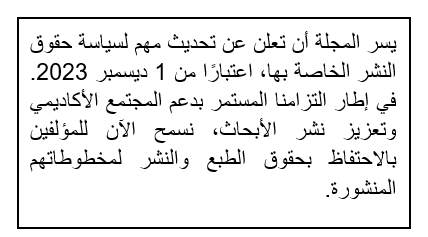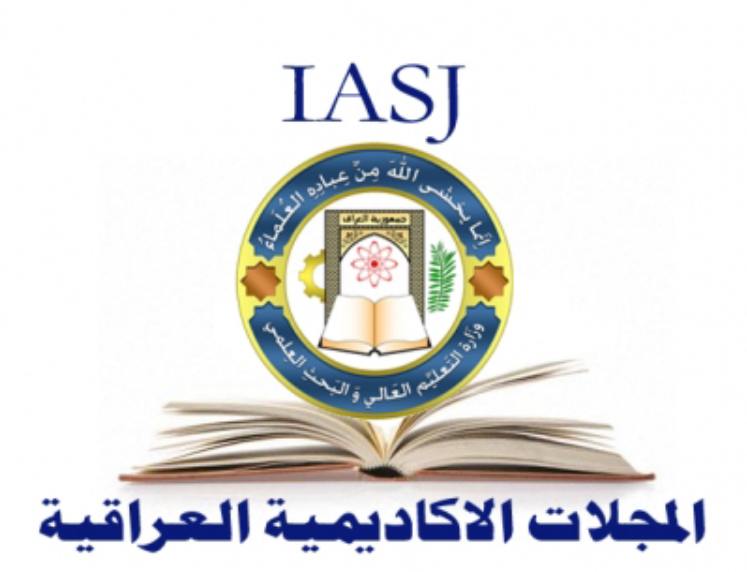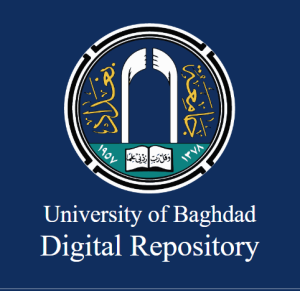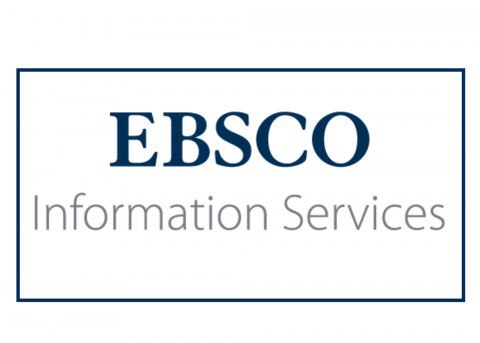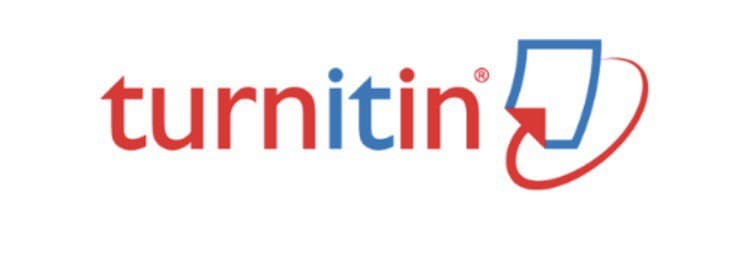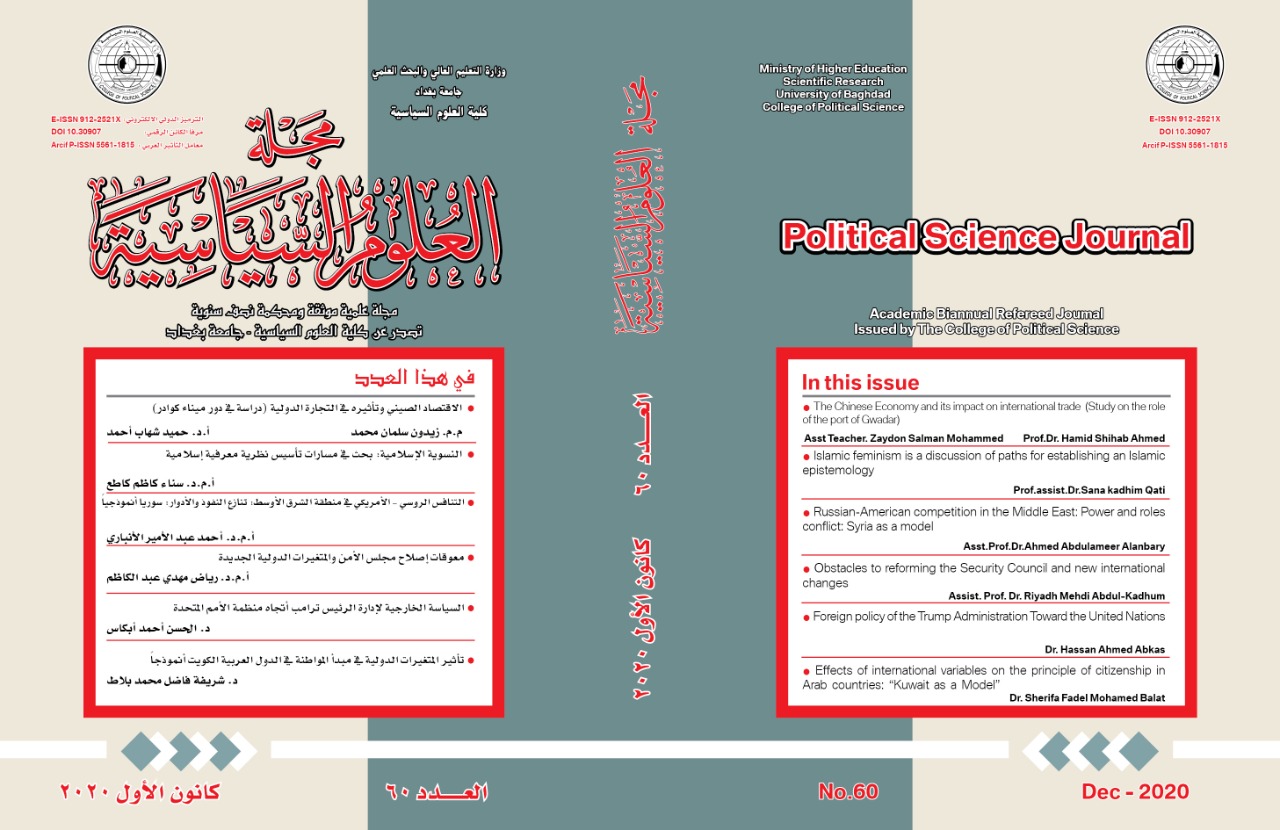تفسيرات في عملية صنع القرار السياسي في السياسة الخارجية الأمريكية: منظور نقدي تاريخي مقارن
DOI:
https://doi.org/10.30907/jj.v0i62.593الكلمات المفتاحية:
عملية صنع القرار السياسي، صناع القرار، الولايات المتحدة الأمريكية، منظور نقدي تاريخي مقارن، السياسة المقارنة في صنع القرار السياسي الأمريكي، السياسة الأمريكية، دور وسائل الإعلام والاتصالات في عملية صنع القرار السياسيالملخص
تاريخ الاستلام:17/2/2021 تاريخ قبول النشر:16/3/2021 تاريخ النشر:31/12/2021
 This work is licensed under a Creative Commons Attribution 4.0 International License.
This work is licensed under a Creative Commons Attribution 4.0 International License.
هدف الدراسة: تهدف هذه الدراسة على تسليط الضوء على مجمل التناقضات الحاصلة في عملية صنع القرار السياسي في الولايات المتحدة الأمريكية، والتي أثبتت تاريخيا مدى نجاحها على المدى القصير، وفشلها على المدى الطويل. المنهجية: ترتكز الدراسة على استخدام المنهج الوصفي التاريخي المقارن، كما سوف تعتمد الدراسة على استخدام أربعة نماذج لدراسة نتائج عملية صنع القرار الأمريكي واختلافاتها تلك النماذج هي: ١. النموذج الفردي العقلاني (النموذج الأول)، ٢. النموذج التنظيمي والجماعي (النموذج الثاني)، ٣. النموذج الحكومي البيروقراطي (النموذج الثالث)، ٤. النموذج الإعلامي "وسائل الاتصالات والمعلومات" (النموذج الرابع). النتائج: أسفرت نتائج الدراسة على أن النموذجين الفردي والعقلاني، والإعلامي، من أهم العوامل الرئيسية المفسرة لفشل عملية صنع القرار الأمريكي على المدى الطويل. الخلاصة: خلصت الدراسة إلى أن هناك تناقضات في عملية صنع القرار الأمريكي على المدى الطويل في مقابل المدى القصير، وعند تطبيق النماذج الأربعة السابقة الذكر، تم التأكيد على أن هناك تأثير واضح للنموذجين الأول والرابع في تفسير ذلك التناقض والفشل على المدى الطويل، ولكن شمولية النماذج المختلفة الأخرى (النموذج الثاني والثالث) من شأنها أن تساعد أيضا في فهم وتفسير عملية صنع القرار الأمريكي.
المراجع
References
- Allison, G. (1969). Conceptual models and the Cuban Missile Crisis. The American Political Science Review, 63 (3), 698-718.
-Allison, G., and Halperin, M. (1972). Bureaucratic politics: A paradigm and some policy implications. World Politics, 24, 40-79.
-Allison, G. and Zelokow, P. (1999). Essence of decision: Explaining the Cuban Missile Crisis, 2nd ed. Pearson. P:379-387.
-Bastiansen, H., Klimke, M., and Warenskjold, R. (2019). Media and the Cold War in the 1980s: Between Star Wars and Glasnost. Cham, Palgrave Macmillan. P: 115-145
-Bernhard, N. (1999). U.S Television News and Cold War Propaganda, 1947-1960. Cambridge, Cambridge University Press.
-Boulianne, S. (2015). Social media use and participation: a meta-analysis of current research. Journal of Information, Communication and Society, 18 (5): Communication and Information Technologies Section (ASA) Special Issue.
-Bueno de Mesquita, B., and Lalman, D. (1992).War and reason: domestic and international imperatives.New Haven, CT: Yale University Press. P: 265-278.
-Bueno de Mesquita, B., Smith, A., Siverson, R., and Morrow, J. (2003). The logic of political survival. Cambridge, MA: The MIT Press. P: 273-326
-Charlesworth, J. (1967). Contemporary political analysis. 1st ed. New York: Free Press. P: 274.
-Cohen, B. C. (1963). The press and foreign policy. Princeton University Press, 627.
-Destler, I.M. (1972). Presidents, bureaucrats and foreign policy: the politics of organizational reform. Princeton, NJ: Princeton University Press. P: 52-65.
-Dougherty, J., and Pfaltzgraff, R. Jr. (2001). Contending theories of international relations: a comprehensive survey. 5th ed. New York: Longman. P: 553-615
-Hacker, K., Michael, C., Chris, W., and Gerri, M. (2006). Possible uses of blogs and computer-mediated communication for depolarizing political discourse. Communication and Technology of the International Communication Association Dresden, Germany.
-Hallin, D. (1984). The media, the war in Vietnam, and political support: A critique of the thesis of an oppositional media. The Journal of Politics, 46 (1), 2-24.
-Halperin, M., and Clapp, P. (2006). Bureaucratic politics and foreign policy. 2nd ed. Washington, DC: Brookings Institution Press. P: 9-24.
-Hermann, C., Kegley, C., and Rosenau, J. (1987). New directions in the study of foreign policy. Boston: Allen & Unwin.
-Iyengar, S., and Simon, A. (1993). News coverage of the Gulf crisis and public opinion: A study of agenda-setting, priming, and framing. Communication research, 20(3) 365-383.
-Janis, I. (1982). Group Think Psychological studies of policy decisions and fiascos. 2nd ed. Wadsworth: Cengage Learning. P: 176-274.
-Jones, Christopher M. (2017). Bureaucratic politics and Organizational Process Models. International Studies Association and Oxford University Press. Oxford Press (online publication). https://doi.org/10.1093/acrefore/9780190846626.013.2
-Kim, S., Scheufele, D.A., and Shanahan, J. (2002). Think about it this way: Attribute agenda-setting function of the press and the public’s evaluation of a local issue. Journalism and Mass Communication Quarterly, 79(1) 7-25.
-Lewis, D., and Rose, R.P. (2002). The president, the press, and the war‐making power: An analysis of media coverage prior to the Persian Gulf War. Presidential Studies Quarterly, 32(3) 559-571.
-Lippmann, W. (1947). The Cold War: A Study in the US foreign policy. The University of Michigan: Harper.
-Maoz, Z. (1981). The decision to raid Entebbe: decision analysis applied to crisis behavior. The Journal of Conflict Resolution, 25(4), 677-707.
-McCombs, M. E., Shaw, D. L., and Weaver, D. H. (2014). New directions in agenda-setting theory and research. Mass Communication and Society, 17(6), 781-802.
-McLuhan, M., and Powers, B.R. (1992). The global village: Transformation in world life and media in the 21st century. Oxford University Press.
-Most, B. and Starr, H. (1989). Inquiry, logic and international politics. Columbia, SC: University of South Carolina Press. P: 23-46.
-Neack, L. et al. (1995). Foreign policy analysis: Continuity and change in its second generation. Prentice Hall. P: 85-96.
-Rosati, J. and Scott, J. (2007). The politics of United States foreign policy. 4th ed. Thomson Wadsworth. P: 103-139.
-Rosenau, J. (1990). Turbulence in world politics: A theory of change and continuity. London: Frances Pinter. P: 19-31.
-Russett, B., Starr, H., and Kinsella, D. (2010). World politics: The menu for choice. 9th ed. Boston: Wadsworth. P: 105-134.
-Shaheen, J. (2001). The reel bad Arabs: How Hollywood vilifies a people. New York: Olive Branch Press.
-Simon, H. (1985). Human nature in politics: the dialogue of psychology with political -science. American Political Science Review, 79, 293-304.
-Starr, H. (1994). Revolution and war: rethinking the linkage between internal and external conflict. Political Research Quarterly, 47(2), 481-507.
-Strömbäck, J., and Dimitrova, D.V. (2006). Political and media systems matter: A comparison of election news coverage in Sweden and the United States. Harvard International Journal of Press/Politics, 11(4) 131-147.
-Williams, B.A., and Delli Carpini, M.X. (2000). Unchained reaction: The collapse of media gatekeeping and the Clinton-Lewinsky scandal. Journalism 1(1) 61-85.





